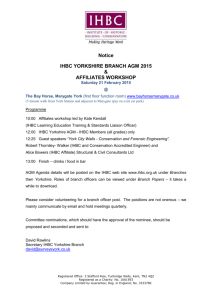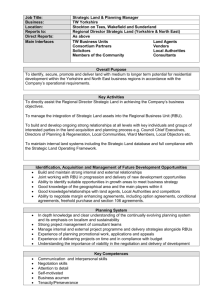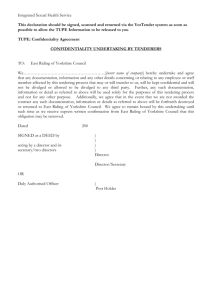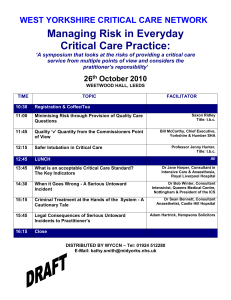1
advertisement
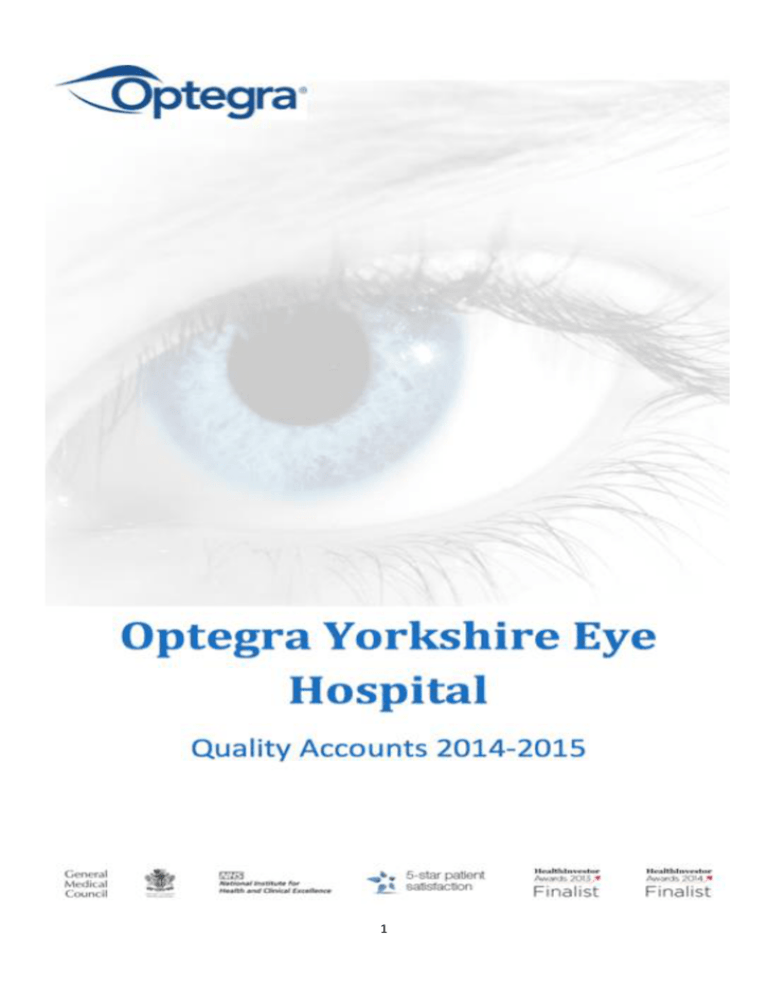
1 Contents Introduction Welcome to Optegra Page 3 Optegra Pledge Page 4 Welcome to Optegra Yorkshire Eye Hospital Page 5-6 Part 1: 1.1 1.2 Statement of Commitment, Rory Passmore, Optegra UK Managing Director Statement of Quality, Sue Boyes, Yorkshire Eye Hospital Director Page 8-9 Page 10 Part 2: Priorities for Improvement 2015 / 2016 Page 11-20 Statement of Assurance Page 21 Statement of Quality Delivery Page 24-26 Part 3: Review of our Quality Performance 2014 “A Look Back” Page 27-28 Glossary Page 29 2 Introduction. Welcome to Optegra Optegra was founded with the aim of creating world-class centres for excellence in eye care in the UK and international markets. This didn’t just mean providing the very best treatments available. We wanted to create a completely new premium kind of experience: one that offers superb levels of care and attention for everyone, every step of the way. Optegra brings together the most advanced treatments, technology and 5 star patient facilities. Our specialist Consultant led teams deliver the highest standards in world class, ultra modern hospitals which have been designed with every detail in mind to make sure your experience is pleasant and stress free. Our Consultant Ophthalmic Surgeons are among the most well respected and renowned practitioners in their field who are NHS trained and members of the Royal College of Ophthalmologists (RCO). With such expertise and specially designed, dedicated eye hospitals, we are completely committed to providing individually, tailored eye care solutions. We aim to deliver outstanding results, a speedy recovery – a whole new quality of life. 3 Optegra Pledge Optegra provides personalised eye care by expert clinical teams at our specialist hospitals dedicated to eyes, to deliver the optimum outcome for you. With our care, its not just eye care, its complete care. 4 Optegra Yorkshire Eye Hospital In the UK we have 6 hospitals and are currently in the process of opening a Hospital in central London. Optegra Yorkshire Eye Hospital is a private hospital situated between Leeds and Bradford. The hospital offers care to NHS patients, patients with private medical insurance and patients who wish to fund their own treatments. The hospital provides a full range of Ophthalmic services, including outpatient consultations, diagnostics and surgery, through to follow-up care. During the period January 2014 – December 2014 the hospital has had 33,165 patients through its doors, and approximately 30 % were treated under the care of the NHS. There are 23 specialist Ophthalmic Consultants working in the hospital who are amongst the best in the world: highly recognised in their field and completely committed to providing our patients with first class treatments. They are all NHS trained and Fellows of the Royal College of Ophthalmologists (RCO). Our Consultants have many years ophthalmic experience and have undertaken thousands of eye procedures. They are regulated and approved by Optegras Medical Director and Medical Advisory Committee. All have made outstanding contributions to the research, development and practise to new techniques. 5 21 clinical staff including the Clinical Services Manager, Nurses and Healthcare Technicians support the Consultants. There is also a skill mix of Optometrists and Orthoptists as well as a fundal photographer, a 17 strong Administration team managed by our Patient Service Manager, along with dedicated Facilities and Housekeeping support, supports the hospital. The Hospital is also supported by a Regional Business Manager. The hospital has built an excellent relationship with Leeds Teaching Hospital Trust, Bradford Teaching Hospitals and Airedale Foundation Trust to deliver a collaborative approach to patient care. Our field-based Professional Partnership Managers provide vital links to the Optometry community and GP’s to ensure their needs and expectation are managed through a partnership referral process and streamlined patient choice referrals. What Our Optometry Community Say About us “Optegra provide wide range of specialist ophthalmic services and receive the majority of our private referrals. Patient feedback is consistently high and clinical outcomes are excellent. Optegra seem to ensure that all the tests required by the specialist are done together and patients really appreciate this because it avoids additional appointments.” Mike Procter. Harrogate, HG1 2QZ Paul Verity, Paul Verity Opticians, West Yorkshire “As a group of three West Yorkshire independent optometry practices we feel blessed to have such an excellent resource as the Optegra Yorkshire Eye Hospital on our doorstep. It enables us to refer patients in the complete confidence that they will receive highest quality treatments from excellent specialists, using the latest equipment in pleasant, relaxed surroundings. We have developed a close working relationship with Optegra through their local Business Development Manager which means referrals are always actioned quickly and effectively. I would recommend Optegra to both my patients and my professional colleagues.” 6 Robert Foulds, Donovan Smith Opticians, Brighouse “We refer our patients to Optegra in total confidence they will see the chosen Ophthalmologist who specialises in the appropriate field and receive the very best clinical care in a modern and comfortable environment embracing the very latest available technology. Our referrals are always processed efficiently with excellent feedback at each stage of the patient journey.” Giles Price, Christopher Nixon Optometrists, Harrogate “When referring my patients to the specialist ophthalmologists at Optegra Yorkshire Eye Hospital I am assured that they will receive first class medical treatment. Moreover, the entire team at Optegra ensure that our patients experience the very best care throughout their journey from initial referral to discharge.” 7 Part 1 1:1 Statement of Commitment Optegra UK Ltd is totally committed to fostering an organisational culture that puts the patient at the centre of everything the Optegra Yorkshire Eye Hospitals does. The Optegra Yorkshire Eye Hospital was established by its founding surgeons specifically to demonstrate the highest levels of patient safety, clinical outcomes and customer satisfaction. It is that vision that remains at the heart of our dedication to the highest levels of quality and reflected in the Optegra mission statement - “To be the worlds most trusted choice for eye care" The hospital was acquired in February 2010 by Optegra UK, who specialise in Ophthalmology services across the country and is one of six hospitals based in the UK, with the others being situated in Surrey, Solent, Manchester, Birmingham and London. As Managing Director of Optegra UK, I am passionate about ensuring that high quality patient care is at the centre of all we do and how we operate in all our facilities. This relies not only on excellent medical and clinical leadership in our hospitals but also upon our overall continuing commitment to drive year on year improvement in clinical outcomes. Following the appointment of our Head of Eye Sciences role in 2011, we have expanded the use of Medisoft, the UK's only Ophthalmology specific patient pathway system that records patient clinical data from onset to discharge. It has a comprehensive audit element that records both pre and post-surgical outcomes and also surgical and anaesthetic complications. For the first time Optegra UK now generates consistent and high quality surgical outcome data for all of its hospitals. Our Head of Eye Sciences, in conjunction with our consultant Ophthalmologist Medical Director are instrumental in approving any new procedures and technologies into Optegra hospitals and will also provide us with the capability to participate in a wide range of research projects. As a provider of ophthalmic healthcare, we have continued to work hard in 2014 to further develop a structured clinical governance framework and risk management system across all our hospitals and we continually review our performance so we can drive improvements to the benefit of all our patients. I believe that delivering clinical excellence depends upon everyone in the organisation; everyone is responsible for ensuring that are delivering high levels performance and constantly seeking to improve. The requirement to ensure clinical excellence is the role of everyone in the organisation and is not about reliance upon one or two people. Across Optegra we nurture teamwork and professionalism, we value our people and set our targets high, and we work hard in every aspect of our services to provide facilities of a high order. We believe in investing substantially in our people, our hospitals and our equipment to ensure care is delivered in a consistent and safe manner at all times. 8 The Optegra Yorkshire Eye Hospital is accustomed to the disciplines of regulatory and contractual requirements to assure health commissioners of our clinical performance and to report complaints and serious incidents accordingly. The hospital maintains a Risk Register and reviews specific actions to achieve risk reduction. To the best or my knowledge as requested by the regulations governing the publication of this document, the information in this report is accurate. Rory Passmore Uk Managing Director 9 1:2 Statement of Quality: This is the fifth quality account issued by the Optegra Yorkshire Eye Hospital and it reflects on performance in the last financial year. A great deal was achieved by clinical and administration teams during 2014/15, in partnership with patients, our commissioners and our professional referring community We are especially proud of our improved performance in our patient satisfaction survey reaching a world class net promoter score of 84. . We delivered on our CQUIN goals… Section 1.1 of the CQUIN was to continue with the Friends and family test at Optegra Yorkshire Eye Hospital. This part of the CQUIN has been achieved with the returns being higher in quarter 1 and quarter 4. Section 1.2 of the CQUIN was to improve performance on the staff Friends and Family Test. The goal was to achieve a better result in 2014/15 compared with the 2013/14 result. This part of the CQUIN has been achieved with an increase of the staff recommending Optegra. Our research and surgical outcome profile remains strong and we continue to audit and evaluate to continually improve our services. We recently successfully completed a clinical evaluation of a new intraoperative imaging system and were delighted that we were able to invite NHS and private patients attending Optegra Yorkshire Eye Hospital for cataract surgery, to take part in the study. Working with our CCG programme for 2015/16 we look forward to continuing to provide a quality service to all our patients Sue Boyes Hospital Director 10 Part 2 Priorities for Improvement 2015/2016 Through a process of audit and feedback, we strive to make the patients experience the best it can be. This is through a process governed by clinical effectiveness, safety, national guidance and recommendations. The Hospitals priorities for improvement have and will continue to be determined by evaluating and acting upon our governance processes and learning from our patients and staff. Patient Safety Never Events are serious and largely preventable patient safety incidents that should not occur if preventable measures have been implemented. The full ‘never events’ list for reference is: (www.gov.uk/government/news/never-events.list) wrong site surgery (appropriate to Optegra) wrong implant/prosthesis (appropriate to Optegra) retained foreign object post-operation (appropriate to Optegra) wrongly prepared high-risk injectable medication maladministration of potassium-containing solutions wrong route administration of chemotherapy wrong route administration of oral/enteral treatment intravenous administration of epidural medication maladministration of Insulin overdose of midazolam during conscious sedation (appropriate to Optegra) opioid overdose of an opioid-naive patient inappropriate administration of daily oral methotrexate suicide using non-collapsible rails escape of a transferred prisoner falls from unrestricted windows entrapment in bedrails transfusion of ABO-incompatible blood components transplantation of ABO-incompatible organs as a result of error misplaced naso- or oro-gastric tubes wrong gas administered failure to monitor and respond to oxygen saturation air embolism misidentification of patients severe scalding of patients maternal death due to post partum haemorrhage after elective Caesarean section. 11 There are 4 core ‘never events’ which will continue to form part of our measurement of patient safety during 2015/16. Wrong site surgery Optegra Yorkshire Eye Hospital continues as standard practice to use the World Health Organisation (WHO) recommendations for safer surgery checklist. It is a tool used throughout cataract surgery to improve safety through effective communication and setting out safety checks throughout the perioperative period. As part of the of the pre operative checking protocol the surgery site is marked and checked with the patient and consent form as part of the day care nurses duties. This safety check is carried out again by the anaesthetic/escort nurse and then a further time by the scrub nurse, before surgery is commenced. The hospital has consistently achieved compliance throughout 2014 for completion of the checklist and it has now become standard in the patient surgical pathway. It will continue to be audited and evaluated throughout 2015/16. Due to its success in maintaining safety measures, the checklist has now been adapted, and is used for all types of surgery, moving forward for the year 2015/16. Wrong Implant / prosthesis “Wrong intraocular lens implant; learning from reported patient safety incidents” (SP Kelly Feb 2011) showed that a large percentage of incidents of wrong implantation of Intra Occular Lens, were due to wrong lens selection. Optegra Yorkshire Eye Hospital have worked hard to raise awareness of this never event, through education, communication and robust audit processes. Through this process we have achieved 100% compliance throughout 2014 with the Lens Checking Protocol. This best practice and cycle of audit will continue during 2015/16. The WHO Surgical Safety Checking audit is now completed monthly in conjunction with our Lens Checking Protocol audit, as these 2 audits have enhanced the Safety of our Patients during the Perioperative period. These audits are carried out by a different member of the clinical team every month and we have found that this responsibility has helped to instill confidence, pride and a sense of achievement within the team. 12 Clinical Audit Matrix 2014 Area Jan Feb Mar April May June July Aug Sept Oct Nov Dec Lens Checking Protocol Audit 100% 100% 100% 100% 100% 100% 100% 100% 100% 100% 100% 100% WHO Surgical Safety for Cataract Surgery Audit 100% 100% 100% 100% 100% 100% 100% 100% 100% 100% 100% 100% Documentation Audit Decontamination Audit Hand Hygiene Audit Clinical Waste Pre-Acceptance Audit Consent Audit Medicines Management Audit Prescribing Audit (Local) Environmental – Clinical YEH – OPD Pre/post op/theatre Environmental – Leeds Site Antimicrobial Prescribing Audit (Local) Retained Foreign Object Post Operation The association for pre operative practice (AFPP 2011) and the association of pre operative registered nurse (AORN 201) state ‘ a count must be taken for all procedures where countable objects are used, eg swabs, instruments and sharps. However guidance has been taken from the WHO guidelines for safe surgery 2009, which states ‘specific low risk procedures, such as cystoscopy and cataract surgery can be exempted for the counting protocols. Retained foreign objects rarely occur due to the nature of our surgery but extra vigilance is undertaken due to the tiny microscopic sutures used sometimes, and needle counts are be carried out when they are used. 13 Overdose of Midazolam during conscious sedation Few procedures require the need for sedation at the Optegra Yorkshire Eye Hospital. There is always a Consultant Anaesthetist on site for this process and you will be closely monitored. You will always be fully informed of what to expect pre and post operatively. VTE Risk Assessment (Venous Thrombo-Embolism) From 1 June 2010, the Department of Health (DoH) requires that VTE risk assessments take place for every patient, and that results are closely monitored in order to reduce the 25,000 preventable deaths that occur in UK hospitals every year. All nurses and health care assistants need to understand VTE prevention procedures, and the reasons why these procedures take place. The National Institute for Clinical Excellence (NICE 2010) recommends that all patients should be assessed for risk of developing thrombosis (blood clots) on a regular basis, as follows: every patient should be assessed on admission to hospital every patient should be assessed again, 24 hours after admission to hospital every patient should be assessed again, whenever their medical condition changes every patient should be assessed again before discharge every patient should receive information on how to continue preventative measures at home. Due to the nature of our surgery, operation time is less than 90 minutes and therefore the need to assess VTE risk is minimal. (anaesthetic and surgical time greater than 90 minutes increases the risk of developing a VTE) However, at Optegra Yorkshire Eye Hospital, we adhere to the NICE guideline CG92 by asking a series of elimination questions at pre assessment to determine any likely risk, and therefore 100% of all patients undergoing surgical intervention are assessed using the DoH assessment tool. (2010) Education and Training During 2015/16 we aim to improve skill mix and enhance staff clinical skills, through education and training. This will in turn enhance the patient experience and pathway. We will offer a phlebotomy service for consultant to use and all staff will be trained on visual field examination and bandage contact lens removal. 14 Infection Control Infection prevention and control measures aim to ensure the protection of those who might be vulnerable to acquiring an infection both in the general community and while receiving care due to health problems, in a range of settings. The basic principle of infection prevention and control is hygiene. The World Health Organisation Optegra Yorkshire Eye Hospital understands that ‘good infection prevention and control are essential to ensure that people who use health and social care services receive safe and effective care. Effective prevention and control of infection must be part of everyday practice and be applied consistently by everyone’. The Social Care Act 2008 (updated Jan 2011) The Infection Prevention & Control Team (IPC) Tanith Turner-Lumb. Clinical Services Manager Jackie Mann. RGN. IPC Link Nurse Dr Miles Denton. Consultant Microbiologist. Leeds Teaching Hospital (Advisor Capacity) Michael Horsley. IPC Nurse. Bradford CCG. (Advisor Capacity) Optegra Yorkshire Eye Hospital appreciates that effective infection prevention and control is integral to monitoring risk management. This is not only in maintaining the quality of patient care but also in the protection of staff and improved attendance in the workplace. The hospitals infection control processes are coordinated by an experienced senior nurse, who has support from a Consultant Microbiologist and an Infection Prevention and Control Link Nurse from Bradford CCG. The hospital has quarterly Infection Prevention Committee meetings and an updated annual plan has been submitted and approved for 2015. The hospital staff has access to up to date infection control policies including one that involves patients with Ebola and have been involved in a rolling programme of updating on training. An infection control audit programme has been maintained throughout 2014 and will continue for the future year. This will include hand hygiene, environmental and decontamination of waste. 15 Infection Control Audits that were undertaken in 2014: Infection Control audits undertaken and average scores for 2014 were: Hand Hygiene 99.9% - this was due to a member of staff wearing a wrist watch and wearing a long sleeved shirt. Further training has been given to staff members about the importance of ‘bare below the elbows’. Environmental 88.46% - this was due to some areas being missed, and not being dusted. House keeping did have some staff shortages in 2014. Facilities manager is aware of this issue. Decontamination 99.9% - this was due incorrect disposal. Paper waste was found in a sharps bin. Benchmarking It is seen that benchmarking or the collection of performance information or measures and making comparisons with other compatible organisations is maintaining our transparency within the independent sector providers. Benchmarking, is now recognised as an essential technique for achieving continuous improvement, by allowing us to analyse and improve key care processes, eliminate waste, and improve performance. Benchmarking's strength is that it allows us to make decisions based on facts, not intuition or 'gut feeling. Callisto Study – Clare O’Donell. Head of Eye Sciences We recently successfully completed a clinical evaluation of a new intraoperative imaging system and were delighted that we were able to invite NHS and private patients attending Optegra Yorkshire Eye Hospital for cataract surgery, to take part in the study. In summary, an imaging system was being evaluated that projects a video overlay onto a live image of the eye that can be seen through the surgical microscope during cataract surgery. The overlay displays surgical assistance tools including templates for rhexis creation and reference/target axis templates for toric IOL alignment. Appropriate approvals were naturally obtained and 72 patients who met the inclusion criteria (significant corneal astigmatism and undergoing phacoemulsification and intraocular lens surgery) took part. Study participants received a commercially available CE-marked Zeiss monofocal toric intraocular implant (versus a spherical IOL) and the surgeon utilised the intraoperative imaging system during the surgery on the test group. The benefits to participants were potentially a better visual and refractive clinical outcome (through correction of the corneal astigmatism with a toric IOL). Participants were offered a contribution to expenses incurred. 16 The ophthalmologist investigators (all Consultant Ophthalmic Surgeons) included Yorkshire’s Mr Shafiq Rehman, who has extensive experience in research and cataract surgery. The results of this study are being finalised at present and it is envisaged that these will be submitted for publication in peer reviewed scientific journals in due course. Interim data have been presented at an international research meeting. CQUIN Scheme From April 2013 the Optegra Yorkshire Eye Hospital, entered into a contract with NHS Airedale Bradford and Leeds for the provision of NHS services, through the Commissioning of Quality & Innovation Payment Framework (CQUINS). Payment is conditional on achieving quality improvement in the following area. Introduction of the Friends and family Test – to improve the experience of patients in line with domain 4 of the NHS outcomes framework. The friends and family test will provide timely, granular feedback from patients about their experience. Goal 1 – to increase the response rate Goal 2 – improve performance on the staff, friends and family test Our CQUIN scheme for 2015/16. The scheme agreed with our commissioners is: To continue with the Friends and Family Test – to improve the experience of patients in line with domain 4 of the NHS outcomes framework. Providing timely, granular feedback from patients about their experience. Shift from day case to out patient procedure – to reduce the number of procedures performed as a day case with a corresponding increase in the number of these procedures performed as an out patient procedure, therefore improving patient experience. 17 350 300 250 200 150 100 50 0 Ye arl JA FE M AP M JU JUL AU SE OC NO DE y N B AR RIL AY NE Y G PT T V C Tot al Extremely Likely Extremely Likely 44 46 29 17 41 31 38 7 18 28 19 6 324 Extremely Unlikely Likely 14 7 2 0 7 7 7 3 1 7 3 2 60 Neither Likely nor unlikely 0 2 1 0 1 0 0 0 0 1 0 0 5 Unlikely 0 0 0 0 0 0 0 0 0 0 0 0 0 Extremely Unlikely 0 0 0 0 0 0 0 0 0 0 0 0 0 Don’t Know 0 0 0 0 0 0 0 0 0 0 0 0 0 Total 58 55 32 17 49 38 45 10 19 36 22 8 0 Likely Neither Likely nor unlikely Unlikely Don’t Know Total Actual Patient Comments: • • • • • • • • • • • • • • • • • • • • • • • • • Excellent professional service, already recommended several people, all members of staff friendly & give you plenty of time. Quality treatment. Location, excellent facilities. Excellent service, efficient courteous staff, usually no delay except today. The staff are friendly & welcoming, it makes it a pleasure to visit. If only everyone was like this ; the world would be a better place! Well Done! 5 * A high standard of care given in good surroundings. Good consultant, good waiting room, good staff. I have found the practice very efficient & helpful. Extremely likely because of the care & attention I received last time I was here a month ago. Friendly staff, treated with respect, clean environment. Every member of staff polite & efficient. Very good, nice to have a drink too! Good service & very helpful. Gave me all the info I needed & very good advice for the future. Would definitely tell friends & family to come here. "Private" treatment on the NHS. Very happy with every aspect of care given. Convenient for me, very relaxing atmosphere, staff very pleasant & extremely helpful. Excellent care & attention. Very professional. I have been happy with my treatment here. So much nicer than other hospitals! Good efficient service. Very pleased with the service. I think this hospital is excellent & very well run. Extremely efficient, local to where i live, pleasant surroundings without having to walk for miles with a hospital. Quality care & service. Good service & nice people. Convenience, pleasant surroundings & excellent treatment. Friendly, efficient & happy atmosphere. 18 • • Good care, pleasant environment, good communication, punctual appointments - no waiting! Excellent care & treatment & very kind, caring staff. Patient Experience Patient feedback in 2014 has shown that the waiting time in the clinic areas for their appointments has improved on last year and that also on the previous year patients feel more adequately prepared for their procedure. Patient evaluation and feedback has and will always continue to be important to us here at Optegra Yorkshire Eye Hospital, as we strive to make the patients experience the best it can be, for the moment they walk through the door. We continue to use the role of Nurse Coordinator for the Day. This is not only for communicating any outpatient delays but also as a valuable resource when patients telephone the hospital for any clinical advice. The reception team, also continue to inform the patients at point of arrival of any clinic delays. We have found this also works well and reduces anxieties and assists in the management of patients expectations. On the day of surgery the patients have access to an emergency telephone number, to ring to speak to a nurse if they are worried. This has been well received and also helped in managing the patients post operative recovery phase. All patients post operative instructions have been reviewed and the patient is now better informed following their procedure. Our patient experience survey in 2014 85% of our patients are ‘highly likely to recommend’ our services to their family and friends, this is an improvement on the 2013 score of 71%. 19 Slide from Optegra Wide Patient Survey A net promoter score is a measurement of quality by asking the patients to score on a scale of 1-10 how likely they would be to recommend Optegra to their family and friends. Staff continue, to encourage patients to comment on their experience and Patient Liaisons and Consultants continue to receive regular thank you cards. Clinical Effectiveness Optegra Yorkshire Eye Hospital has an Integrated Governance committee that meets on a quarterly basis throughout the year to monitor quality and effectiveness of care. All incidents, near misses, patient and staff feedback are reviewed to determine any trends that may require further analysis or investigation. Recommendations for action and improvement are escalated to the Integrated Governance Steering Committee where lessons learned and actions are shared and disseminated to all Optegra hospitals. This process re-enforces our open and honest culture of patients safety incident reporting and aids in disseminating lessons learnt and aligning best practice at all times. Quality Data and Audit Optegra Yorkshire Eye Hospital continues using its NHS N3 connectivity; this enables our NHS team to communicate securely and safely via the NHS.net email account. This also allows our activity and financial data to be received via the Service Users System (SUS). Staff use the NHS Choose and Book system, which enables patients to access our services with ease and helps our clinical team triage the patients referral for the best possible care. During 2015/16 reporting via this system will be monitored with our commissioners to ensure accuracy and financial payments are made in line with the Payment by Results Framework 2014/15. 20 Optegra Yorkshire Eye Hospital will improve on its Quality data reporting and submit the agreed quality and performance reports to the commissioners on a monthly basis during 2015/16. Statements of Assurance on Quality In accordance with The National Health Service (Quality Accounts) Regulations 2010 Optegra Yorkshire Eye Hospital makes the following statements of assurance: During 2014/15 the Optegra Yorkshire Eye Hospital provided Ophthalmology services to the NHS through the NHS Standard Acute Contract. It did not subcontract out any of those services. The Optegra Yorkshire Eye Hospital has reviewed all the data available to them on the quality of care in all of these NHS services The income generated by the NHS services reviewed in 2014/15 represents 100 per cent of the total income generated from the provision of NHS services by the Optegra Yorkshire Eye Hospital for 2014/15. During 2014/15 no national clinical audits or national confidential enquiry covered NHS services that the Optegra Yorkshire Eye Hospital provides. National Clinical Audits for this period was 0 out of the 51of the inclusion criteria (o%) as they were not pertinent to the ophthalmic speciality. The National Confidential Enquires (NCEPOD) for this period was 1/1 of the inclusion criteria (100%). The Optegra Yorkshire Eye Hospital carried out the following hospital clinical audits: 21 Clinical Audit Matrix 2014 Jan Area Feb Mar May Jun July 93% Documentation Audit Aug Sep Oct Nov Dec 100 % 99.8 % Decontamination Audit Hand Hygiene Audit Apr 100 % 100 % 98% 100 % Clinical Waste Pre-Acceptance Audit Lens Checking Protocol Audit 100 % 100 % 100 % 100 % 100 % 100 % 100 % 100 % 100 % 100 % 100 % 100 % WHO Surgical Safety for Cataract Surgery Audit 100 % 100 % 100 % 100 % 100 % 100 % 100 % 100 % 100 % 100 % 100 % 100 % 100 % Consent Audit Medicines Management Audit 94% (Local) Prescribing Audit 98% (Local) 100 % 97.6 % Environmental – Clinical YEH – OPD Pre/post op/theatre 95.5 % 72% Environmental – Leeds Site Antimicrobial Prescribing Audit (Local) 90% 90% Optegra Yorkshire Eye Hospital intends to continue with the following actions to improve, maintain quality and patient safety of the healthcare provided. Continue to monitor adherence to the Lens checking protocol - monthly Adhere to the WHO recommendations on Safer Cataract Surgery and continue with the implementation for other surgery. Ensure audits are relevant and comply with National guidance and standards 22 The number of patients receiving NHS services provided by the Optegra Yorkshire Eye Hospital in 2014/15 that were recruited during that period to participate in research approved by a research ethics committee was nil. The Optegra Yorkshire Eye Hospital income in 2014/15 was conditional on achieving quality improvement and innovation goals through the Commissioning for Quality and Innovation (CQUIN) payment framework. The Optegra Yorkshire Eye Hospital is required to register with the Care Quality Commission and its current registration status is registered. The Optegra Yorkshire Eye Hospital has the following conditions on registration: None The Care Quality Commission has not taken enforcement action against Yorkshire Eye Hospital during 2014/15. The Optegra Yorkshire Eye Hospital was registered during this period under the Health and Social Care Act 2008 Care Quality Commission (CQC) The Optegra Yorkshire Eye Hospital is subject to periodic reviews by the Care Quality Commission and the last review was 23rd September 2013. The CQC’s assessment of the Optegra Yorkshire Eye Hospital following the review was full compliance achieved against outcomes; Respecting and involving people who use the services Care and Welfare of people who use the services Cleanliness and infection control Supporting workers Assessing and monitoring the quality of service provision The CQC also reviewed Optegra Yorkshire Eye hospital Leeds Laser Site on 12 th December 2013. The CQC’s assessment of the site following the review was full compliance achieved against outcomes; Consent to care and treatment Care and welfare of people who use the services Safety, availability and suitability of equipment Requirements relating to workers Assessing and monitoring the quality of service provision. 23 Optegra Yorkshire Eye Hospital are working hard with all its staff to prepare for the new 5 key areas of inspection: Safety Caring Well Led Responsive Effectiveness Statement of Quality Delivery The Optegra Yorkshire Eye Hospital operates a quality framework to ensure it is accountable for improving the quality of its services and safeguarding the highest standards in creating an environment where clinical care will excel. National Institute for Clinical Excellence. N.I.C.E. Guidelines At Optegra Yorkshire Eye Hospital, all our Consultant practice in accordance with NICE guidance and all have a practising privileges contract. All our clinical staff practise, within CQC and NICE guidelines and within the NMC code of conduct. All our nurses and ODPs are registered with the NMC and HcPc. 24 Relevant guidelines for practice include: https://www.nice.org.uk/guidance Aflibercept solution for injection for treating wet age‑related macular degeneration. TA294. September 2013 Implantation of multifocal (non-accommodative) intraocular lenses during cataract surgery. IPG264. June 2008. Implantation of accommodating intraocular lenses for cataract. IPG209. February 2007. Ranibizumab for the treatment of age-related macular degeneration. TA155. May 2012 Glaucoma quality standard. QS7. March 2011 Patient group directions. MPG2. August 2013 Pre operative testing for elective surgery. CG3. June 2003 Surgical site infections. QS49. October 2013 Risk assessment for Venous Thromboembolism (VTE). CG92. March 2010 Safeguarding Adults and Children The Optegra Yorkshire Eye Hospital undertook a local programme of education for its clinical staff members for the safeguarding of vulnerable adults during 2014. Following several reports and enquiries into safeguarding (such as the Winterbourne View, Francis Enquiry and Saville Enquiry) Optegra Yorkshire Eye Hospital has recognised the importance of working closely with relevant safeguarding boards, for both children and adults. With this in mind further safeguarding training has been attended and policies put in place to protect patients accessing our services. There are two link nurses on site, one for adults and paediatric trained nurse for children, both also have had extra training on recognising and responding to domestic abuse and radicalization of minors and are both government registered to deliver WRAP training. All staff, including administrative, have had access to training on the mental capacity act, deprivation of liberties and safeguarding children. We have a comprehensive up to date resource file for staff to access, and now have policies on restraint and safeguarding children to protect those who may be vulnerable. 25 Return to Theatre The Optegra Yorkshire Eye Hospital treats between 300 and 400 patients for surgery each month. This is planned surgery, and monitoring the numbers of patients who return to theatre is very important. The value is to identify any trends in either the surgical procedure or a specific surgical team. The Optegra Yorkshire Eye rate of return is very low, in 12 years the Optegra Yorkshire Eye Hospital has undertaken over 25,000 surgical procedures with only 6 returns to theatre. During 2014 we had no patient requiring a return to theatre. Staffing in the Work place The Optegra Yorkshire Eye Hospital has a dedicated team of clinical staff with extensive knowledge and experience in Ophthalmology. Sickness, absence rates and staff turnover rates for 2014 are 5% turnover and 4.9% absence Staff appraisals are undertaken annually, and reviewed at 6 months, these directly link to Optegra UK's performance and training systems. The following work has been undertaken again in 2014, to improve on training and development, communication and reward and recognition. Talent Management Communication Reward & Recognition Long Service Awards Shared Values Recognition Raffle ticket awards for exceptional work The number of significant staff injuries was none for the period 2014/ 2015 26 Part 3 Review of our Quality Performance 2014 “A Look Back” The following are the areas for improvement that were highlighted in the Optegra Yorkshire Eye Hospital Quality Accounts for the period 2014 and will remain on our agenda for 2015 To continue to evaluate and audit the Lens checking protocol. The Optegra Yorkshire Eye hospital continued with the lens checking protocol audit on a monthly basis. This audit is carried out by a different member of the clinical team every month and we have found that this responsibility has helped to instill confidence, pride and a sense of achievement within the team. We have achieved 100% compliance in this process during 2014. Due to the success and recognised significance in safety, it has been introduced moving forward into 2015, for all surgical interventions. Patient communication Patient feedback in 2014 has shown that the waiting time in the clinic areas for their appointments has improved on last year and that also on the previous year patients felt more adequately prepared for their procedure. We introduced the role of Nurse Coordinator for the Day, which has continued and has been used for communicating any outpatient delays as well has being used as a valuable resource when patients telephone the hospital for any clinical advice. The reception team began to inform the patients at point of arrival of any clinic delays. We have found this worked well and reduce anxieties and assisted in the management of patient’s expectations. On the day of surgery the patients had access to an emergency telephone number, to ring to speak to a nurse if they are worried. This has been well received and also helped in managing the patients post operative recovery phase. All patients post operative instructions have been reviewed and the patient is now better informed following their procedure. 27 Eliminating Mixed Sex Accommodation (EMSA) The Optegra Yorkshire Eye Hospital has an EMSA plan in place and has submitted its monthly report to the commissioner during 2014/15 There were no breaches during this period. The Optegra Yorkshire Eye Hospital displayed on its website a declaration of compliance to EMSA as set out by the DOH. Complaints The Optegra Yorkshire Eye Hospital has received No formal complaints during 2014. We believe that listening to our patients and acting upon their suggestions has helped with continual improvement throughout 2014 and is fundamental in providing the highest quality ophthalmic care, which we know, is high on our patient and commissioners agenda. Quality patient care is at the heart of all staff work at Optegra Yorkshire Eye Hospital and we all strive to make the patients experience the best it can be, for the moment the walk through our doors. 28 Glossary of Abbreviations. CQC Care Quality Commission CQUINS Commissioning for Quality and Innovation DOH Department of Health EMSA Eliminating Mixed Sex Accommodation EU European Union IOL Intra ocular lens IPC Infection Prevention and Control VTE Venous Thromboembolism WHO World Health Organisation TDTL. CSM. May 2015. OYEH Quality Accounts Report 29 30
